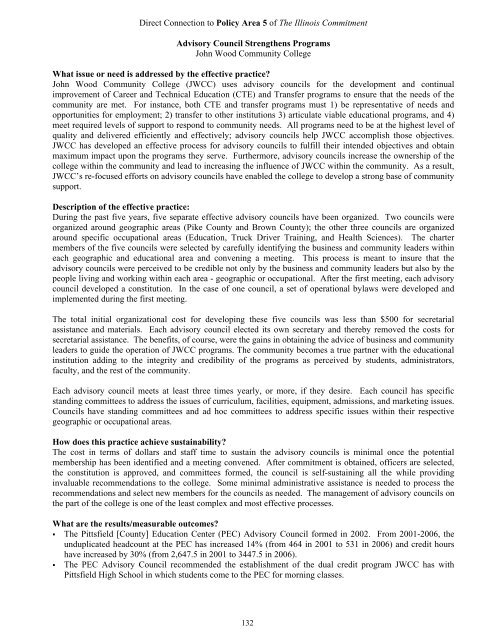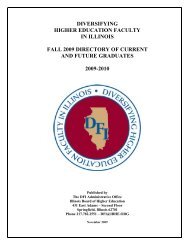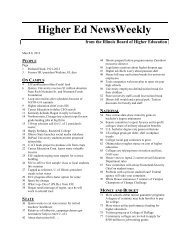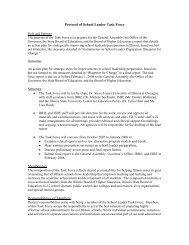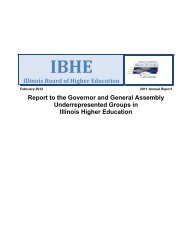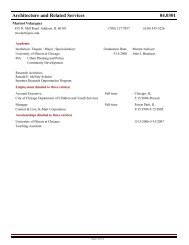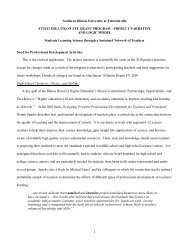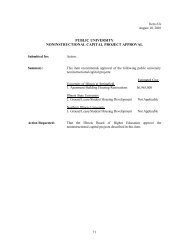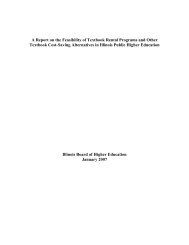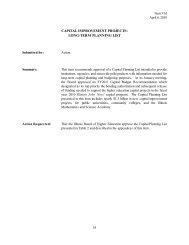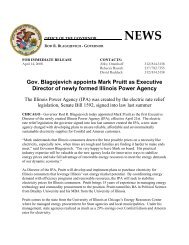Title of Effective Practice: - California Postsecondary Education ...
Title of Effective Practice: - California Postsecondary Education ...
Title of Effective Practice: - California Postsecondary Education ...
Create successful ePaper yourself
Turn your PDF publications into a flip-book with our unique Google optimized e-Paper software.
Direct Connection to Policy Area 5 <strong>of</strong> The Illinois Commitment<br />
Advisory Council Strengthens Programs<br />
John Wood Community College<br />
What issue or need is addressed by the effective practice?<br />
John Wood Community College (JWCC) uses advisory councils for the development and continual<br />
improvement <strong>of</strong> Career and Technical <strong>Education</strong> (CTE) and Transfer programs to ensure that the needs <strong>of</strong> the<br />
community are met. For instance, both CTE and transfer programs must 1) be representative <strong>of</strong> needs and<br />
opportunities for employment; 2) transfer to other institutions 3) articulate viable educational programs, and 4)<br />
meet required levels <strong>of</strong> support to respond to community needs. All programs need to be at the highest level <strong>of</strong><br />
quality and delivered efficiently and effectively; advisory councils help JWCC accomplish those objectives.<br />
JWCC has developed an effective process for advisory councils to fulfill their intended objectives and obtain<br />
maximum impact upon the programs they serve. Furthermore, advisory councils increase the ownership <strong>of</strong> the<br />
college within the community and lead to increasing the influence <strong>of</strong> JWCC within the community. As a result,<br />
JWCC’s re-focused efforts on advisory councils have enabled the college to develop a strong base <strong>of</strong> community<br />
support.<br />
Description <strong>of</strong> the effective practice:<br />
During the past five years, five separate effective advisory councils have been organized. Two councils were<br />
organized around geographic areas (Pike County and Brown County); the other three councils are organized<br />
around specific occupational areas (<strong>Education</strong>, Truck Driver Training, and Health Sciences). The charter<br />
members <strong>of</strong> the five councils were selected by carefully identifying the business and community leaders within<br />
each geographic and educational area and convening a meeting. This process is meant to insure that the<br />
advisory councils were perceived to be credible not only by the business and community leaders but also by the<br />
people living and working within each area - geographic or occupational. After the first meeting, each advisory<br />
council developed a constitution. In the case <strong>of</strong> one council, a set <strong>of</strong> operational bylaws were developed and<br />
implemented during the first meeting.<br />
The total initial organizational cost for developing these five councils was less than $500 for secretarial<br />
assistance and materials. Each advisory council elected its own secretary and thereby removed the costs for<br />
secretarial assistance. The benefits, <strong>of</strong> course, were the gains in obtaining the advice <strong>of</strong> business and community<br />
leaders to guide the operation <strong>of</strong> JWCC programs. The community becomes a true partner with the educational<br />
institution adding to the integrity and credibility <strong>of</strong> the programs as perceived by students, administrators,<br />
faculty, and the rest <strong>of</strong> the community.<br />
Each advisory council meets at least three times yearly, or more, if they desire. Each council has specific<br />
standing committees to address the issues <strong>of</strong> curriculum, facilities, equipment, admissions, and marketing issues.<br />
Councils have standing committees and ad hoc committees to address specific issues within their respective<br />
geographic or occupational areas.<br />
How does this practice achieve sustainability?<br />
The cost in terms <strong>of</strong> dollars and staff time to sustain the advisory councils is minimal once the potential<br />
membership has been identified and a meeting convened. After commitment is obtained, <strong>of</strong>ficers are selected,<br />
the constitution is approved, and committees formed, the council is self-sustaining all the while providing<br />
invaluable recommendations to the college. Some minimal administrative assistance is needed to process the<br />
recommendations and select new members for the councils as needed. The management <strong>of</strong> advisory councils on<br />
the part <strong>of</strong> the college is one <strong>of</strong> the least complex and most effective processes.<br />
What are the results/measurable outcomes?<br />
• The Pittsfield [County] <strong>Education</strong> Center (PEC) Advisory Council formed in 2002. From 2001-2006, the<br />
unduplicated headcount at the PEC has increased 14% (from 464 in 2001 to 531 in 2006) and credit hours<br />
have increased by 30% (from 2,647.5 in 2001 to 3447.5 in 2006).<br />
• The PEC Advisory Council recommended the establishment <strong>of</strong> the dual credit program JWCC has with<br />
Pittsfield High School in which students come to the PEC for morning classes.<br />
132


